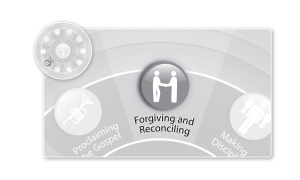 Conflict isn’t bad, you know. It’s not even just an unavoidable problem with which we have to do as we mutually muddle through our marred human existences. As Ken Sande notes, conflict actually provides us with almost unparalleled opportunities to:
Conflict isn’t bad, you know. It’s not even just an unavoidable problem with which we have to do as we mutually muddle through our marred human existences. As Ken Sande notes, conflict actually provides us with almost unparalleled opportunities to:
- Glorify God (by trusting, obeying, and imitating him)
- Serve other people (by helping to bear their burdens or by confronting them in love)
- Grow to be like Christ (by confessing sin and turning from attitudes that promote conflict).
This doesn’t mean, of course, that we rationalize our tendency to spoil for a fight every time our personal ox is gored. After all, the Apostle Paul commands us in Romans 12:18, “If it is possible, as far as it depends on you, live at peace with everyone.”
As odd as it sounds, our Christian maturity ought not to reduce the number or severity of conflicts we get into (see “Calvary, Cross of” and check out 2 Timothy 3:12); instead, it ought to get us in more of the right conflicts and keep us out of more of the wrong ones.
Prioritization is a seldom-noted principle of Christian conflict resolution, but its importance can’t be overstated. It all begins with rightly ordering our loves and knowing what we owe to whom:
36 “Teacher, which is the greatest commandment in the Law?”
37 Jesus replied: “‘Love the Lord your God with all your heart and with all your soul and with all your mind.’ 38 This is the first and greatest commandment. 39 And the second is like it: ‘Love your neighbor as yourself.’ 40 All the Law and the Prophets hang on these two commandments.”
Our highest duty–joy, purpose, command–is love to God. Interestingly, Jesus doesn’t command us to love our neighbor as we love God. He commands us to love our neighbor as we love ourselves. In the parable of the good Samaritan he offers a reflexive definition of neighbors as those in our sphere of influence to whom we show mercy. In Matthew 18:15-31, Jesus makes clear that the mercy we extend to others is a re-presentation of the mercy extended to us by God.
There is an ordering here, a prioritization which Jesus models for us throughout his ministry. Nowhere better do we see this than on the Cross. Though it is popular these days to croon about how I was on Jesus’ mind when he hung on the Cross, the Scripture reveals a different focus of Jesus’ thinking that day: The Father. God so loved the world that he sent his only begotten Son, and the Son loved the Father so much that he only ever did what he saw the Father do. Christ’s perfect love for us is evidenced in his unfailing focus on his Father.
Loving God with all our heart will inevitably put us in conflict with others–even (and not infrequently) in conflict with our own family members. But this is not because love of God and others is a zero-sum game where we must wisely parse out how much love/time/energy/commitment to give to God and how much to give to others. That, after all, is the error of the priest and the Levite in the parable of the good Samaritan.
Instead, what causes the conflict is that often what others want from us will be something other than the love of God. This is what Jesus notes when he says in Matthew 12:46-50:
“Who is my mother, and who are my brothers?” 49 Pointing to his disciples, he said, “Here are my mother and my brothers. 50 For whoever does the will of my Father in heaven is my brother and sister and mother.”
Jesus’ family came to collect and take him home. But Jesus–and we–are not called to give others what they want. We are called to give others what God gives to us. In this way Jesus does not here authorize us to neglect our parents and love God instead, as if there were only so much love to go around. He shows us that what we owe to our parents–and to ourselves, and to our neighbors–is the debt of the love of God. This debt constrains us to remember that our identity has been completely transformed. We are now sons and daughters of God. We may–in fact, are called to–always offer to others that which is after the Father’s own heart, without reservation.
If that is not what they want–and frequently it’s not–then there will be conflict. But for that kind of conflict Jesus teaches us to call ourselves blessed. There is a reward for right priorities at the end of the age, he says. It is then that God will give to us all that others–even our own family members–did not want.
Himself.










